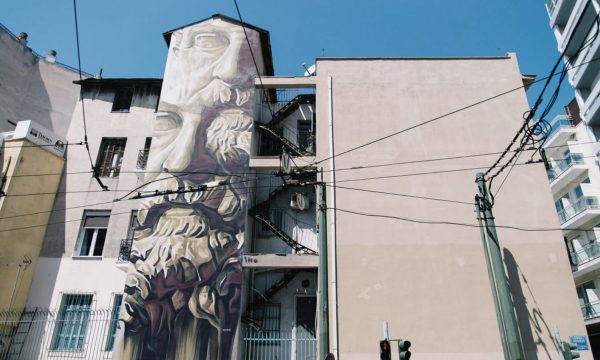Places to visit in Monferrato, Piedmont

Monferrato is a hilly area situated east of Turin in the region of Piedmont. Stretching from the alluvial plains of the Po River to the foothills of the Apennines, Monferrato is divided in two geographical areas: Basso Monferrato (Lower Monferrato) and Alto Monferrato (Upper Monferrato). I was excited as I’d heard a lot about the beautiful places to visit in Monferrato, an area that’s famous for its dreamy landscapes, amazing food and wines, and friendly people! It’s such a beautiful area that UNESCO declared the landscapes of Monferrato a World Heritage site in 2014!
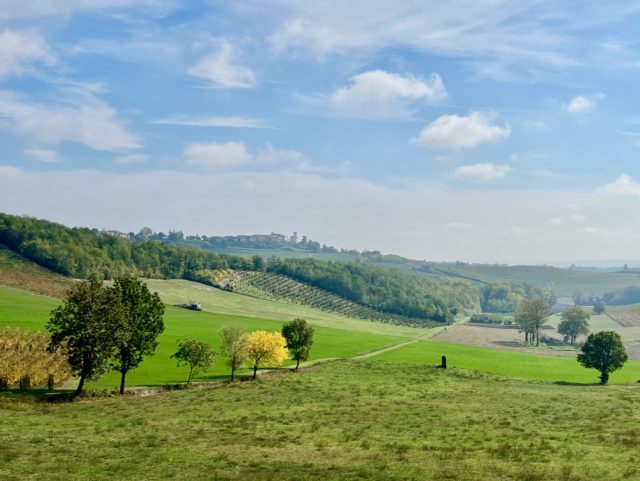
My visit to the Monferrato area was part of a broader road trip around Piedmont. When I was up in the mountains of Val Chisone, I chatted with a lady during dinner one evening. Her eyes lit up when I told her that I was visiting Monferrato. “Take your time to enjoy Monferrato. You have to make time for its food and wines”, she said. “You will be in heaven!”. I knew then that I was in for a very special treat!
I spent several days exploring Basso Monferrato, in the area immediately south of the Po River, in the province of Alessandria. I heeded the lady’s advice and took my time exploring the hills of Monferrato, feasting on its food and wines, and meeting its wonderfully welcoming people. Here are some of the most beautiful places that I visited in Monferrato and my most memorable experiences:
Cella Monte
The first place I visited in Monferrato was Cella Monte. Listed as one of the most beautiful villages of historical interest in Italy (I Borghi più belli d’Italia), Cella Monte sits on a ridge and is surrounded by farms and vineyards.
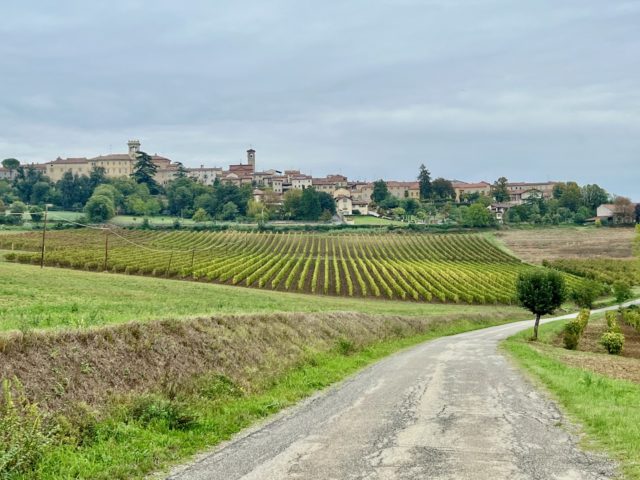
The village itself consists of picturesque cobbled streets, ancient manor houses, hidden courtyards and rustic lanes. The parish church and 17th century San Quirico church, with their alluring interiors and frescoes, are absolutely worth a visit.
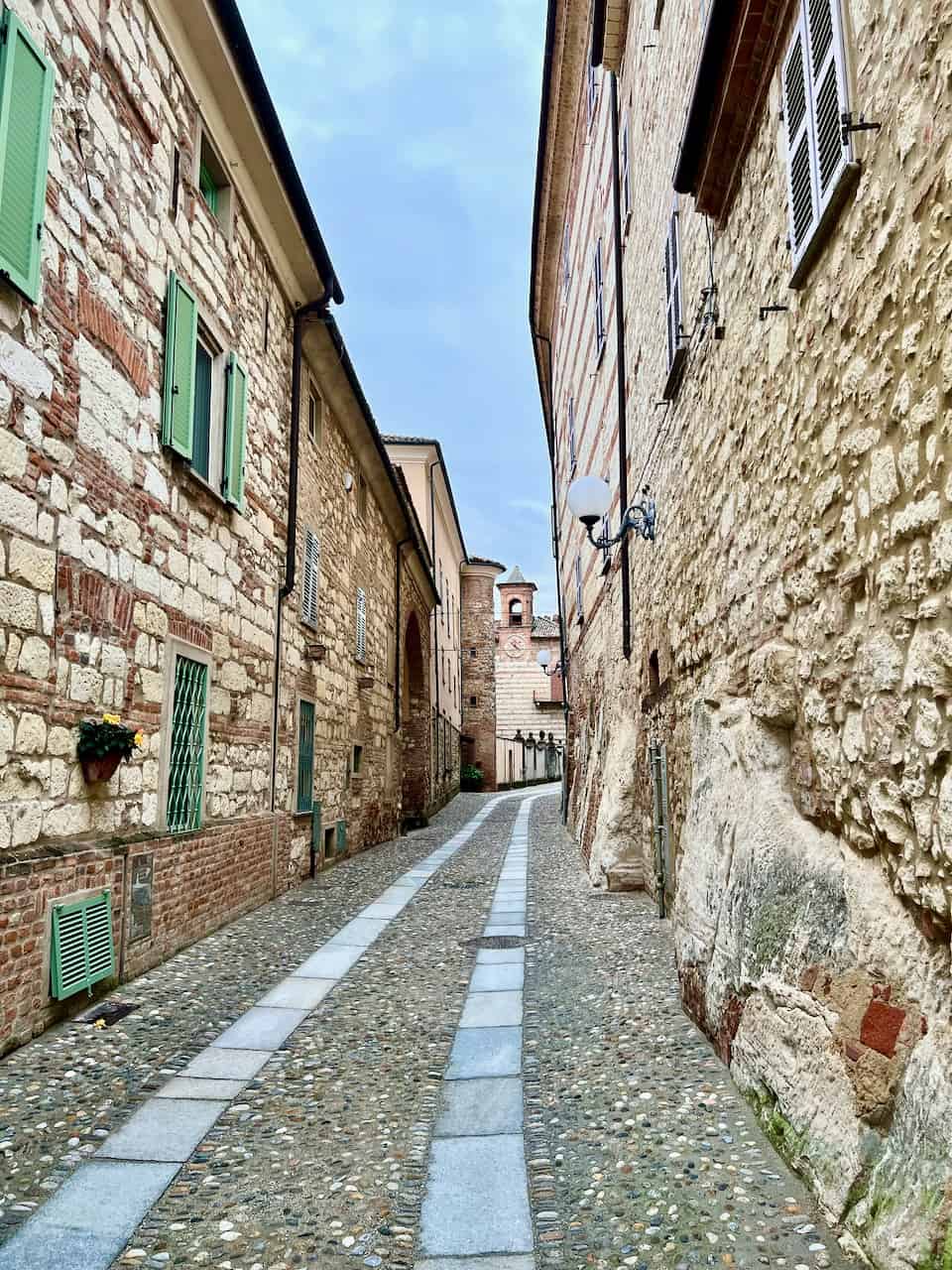
Ecomuseo della Pietra da Cantoni
As I walked around, I noticed the intriguing mix of stone, bricks and mortar in the walls. Upon closer inspection, I even discovered remnants of fossils and shells! I later learned at the village’s Ecomuseo della Pietra da Cantoni (info) about pietra da cantoni, a type of sandstone that can be found throughout the Monferrato area.
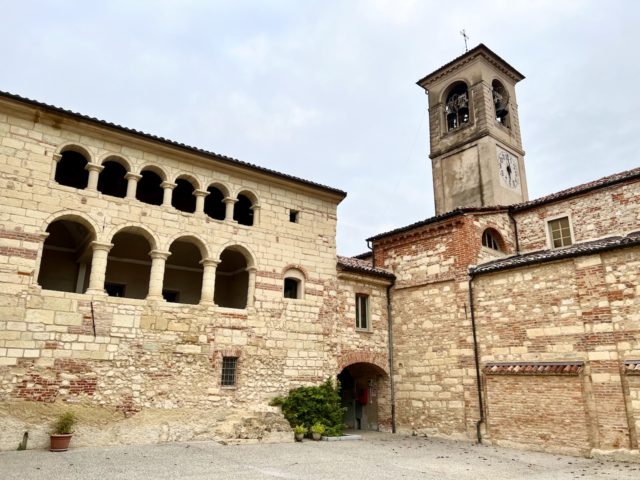
From about the 1st century AD, the inhabitants of the area dug into the soft sandstone to create cellars, storage rooms and tunnels called infernot. These infernot were used to store the finest wines, and can still be seen in many villages and wineries. These beautiful structures are now collectively UNESCO World Heritage sites.

Wine-tasting at Cinque Quinti
I stumbled upon a winery called Cinque Quinti (info), located in a striking manor house. Curious about this place, I knocked on the door to inquire about a wine-tasting. The friendly owner invited me in and took me on a tour of the winery and its infernot. The ancient subterranean tunnels and chambers were absolutely fascinating!
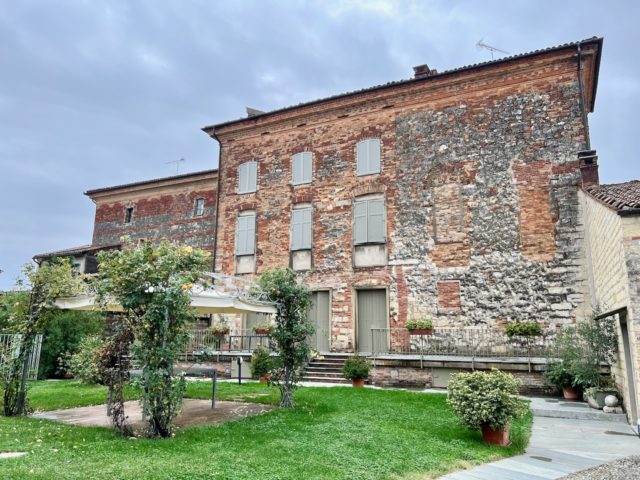
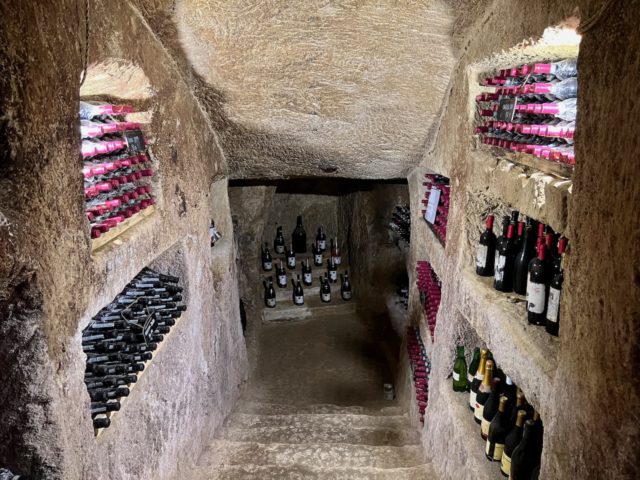
After the tour, I enjoyed a wine-tasting in the courtyard, coupled with some delicious local bites.
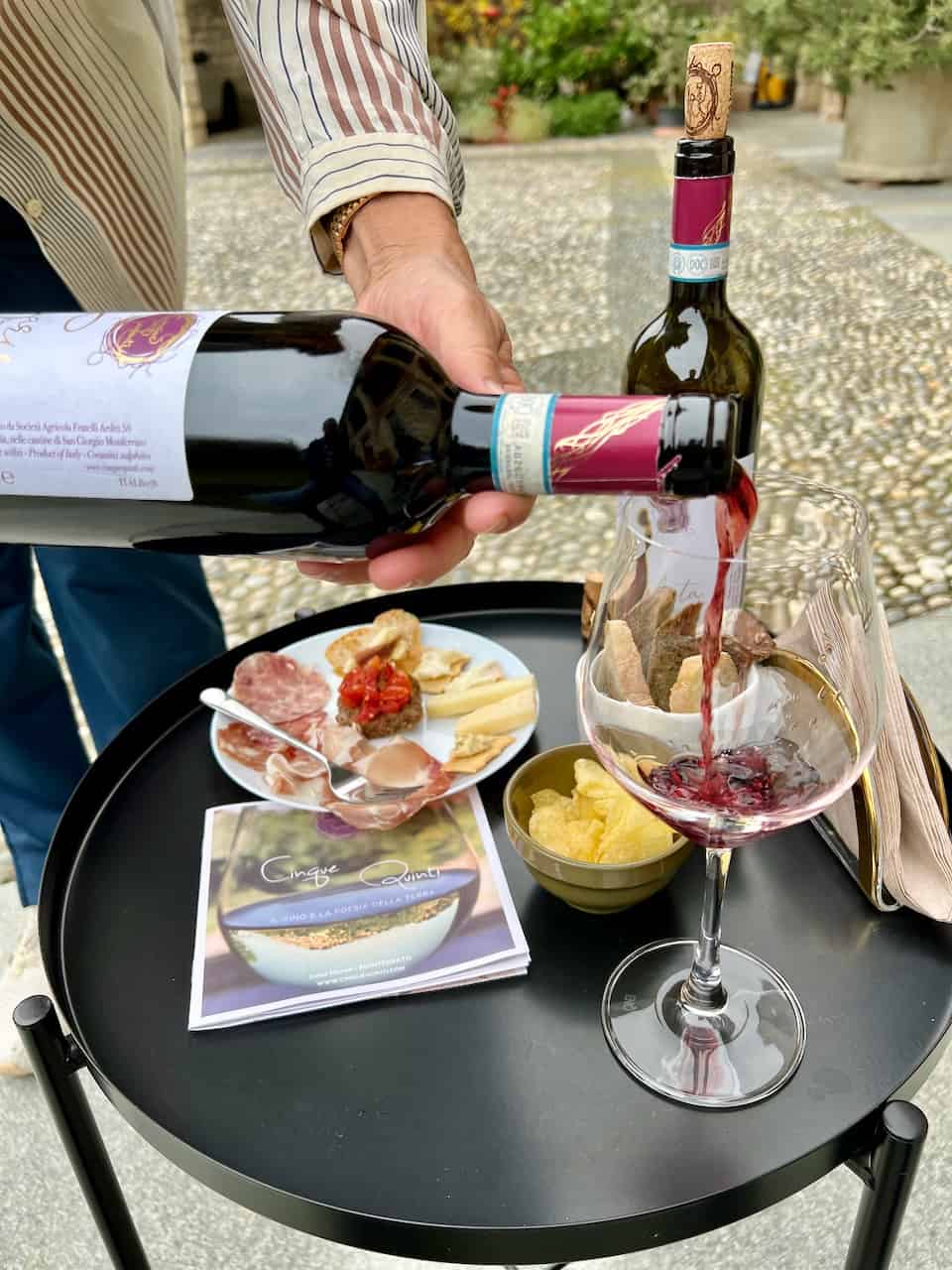
An unforgettable lunch at Agriturismo Fontanella
Before arriving in Cella Monte, I noticed a sign pointing to Agriturismo La Fontanella (info). Feeling hungry, I decided to head down the lane to check it out. I entered the large house and was immediately welcomed with a big smile. I didn’t have a reservation, and despite being full, the kind owners prepared a table for me on the terrace. What followed was a four-course culinary experience (with multiple second servings) I will not easily forget! The family spoiled me with simply divine food and wine from their estate, all served with big, happy smiles.
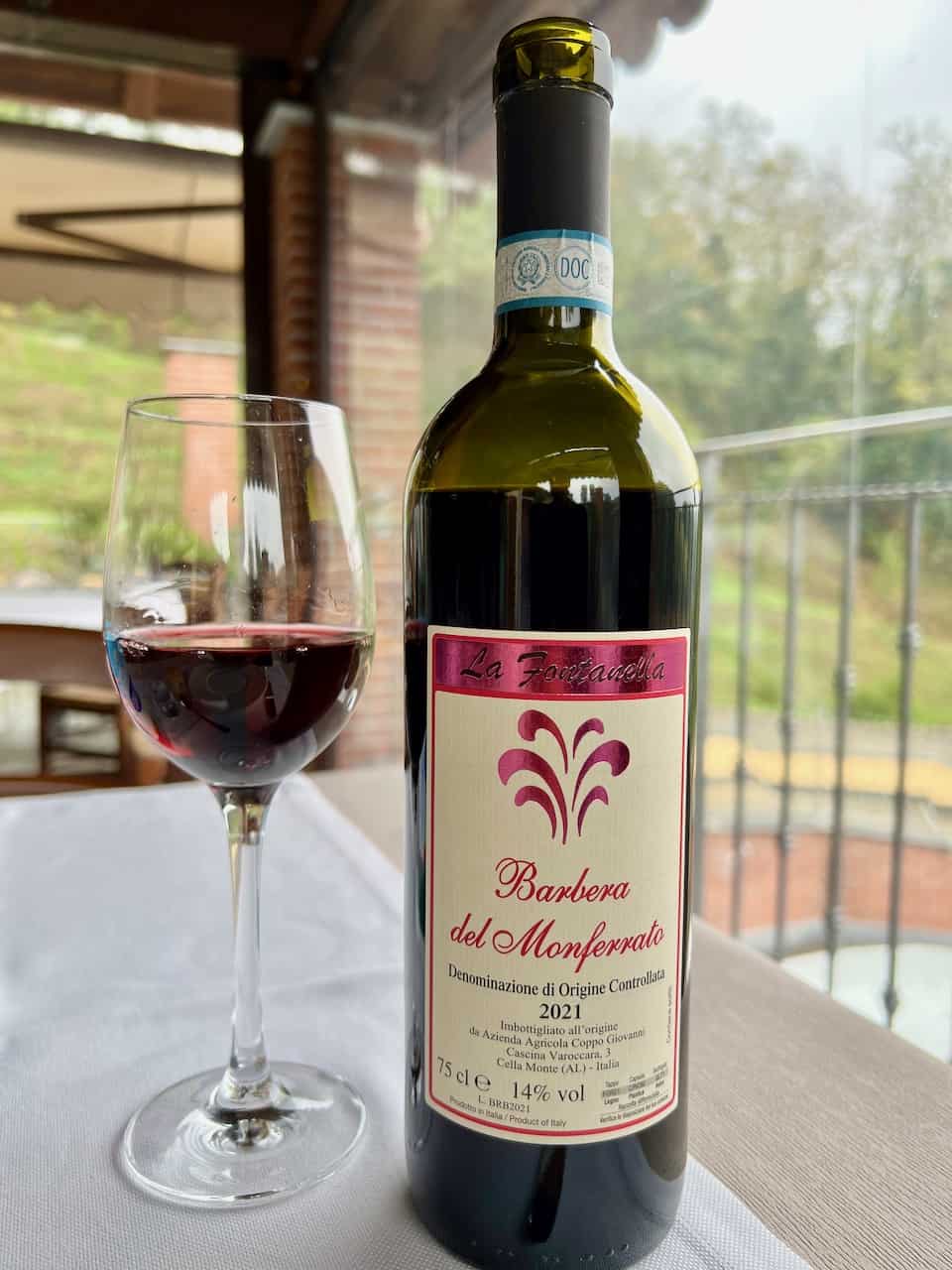
The first course itself consisted of four, separately served, appetisers: ham and salami, carne cruda (raw meat), vitello tonnato (veal with a tuna sauce) and cheeses! The owner’s daughter returned several times for extra servings, and it was hard to refuse! I just could not get enough of the carne cruda and vitello tonnato! The vitello tonnato, with its silky-smooth tuna sauce, was without a doubt the best I’ve ever had!
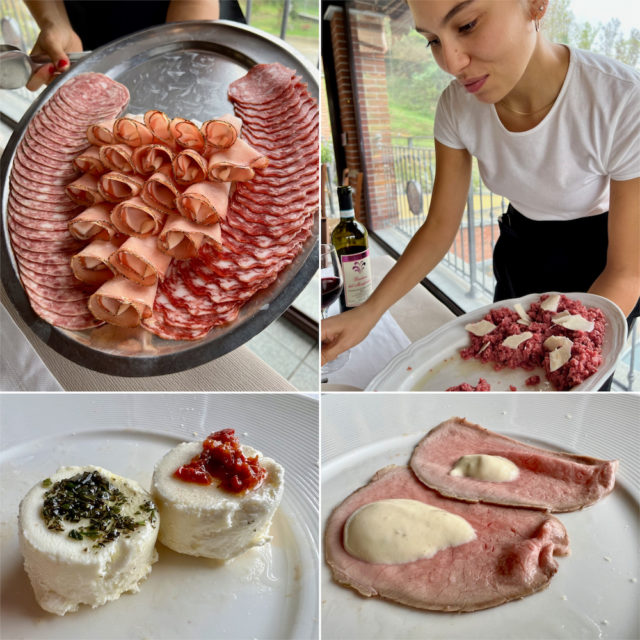
Next up was agnolotti, a stuffed pasta typical of Piedmont. Its filling is a family secret (I asked) but it was absolutely delicious, with rich flavours and a good bite.
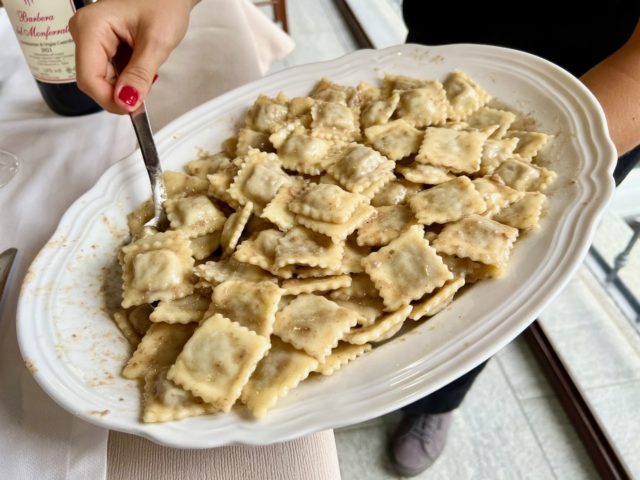
This was followed by the main course: spezzatino, an Italian stew. The meat, with a gorgeous scent of rosemary and sage, was wonderfully tender.
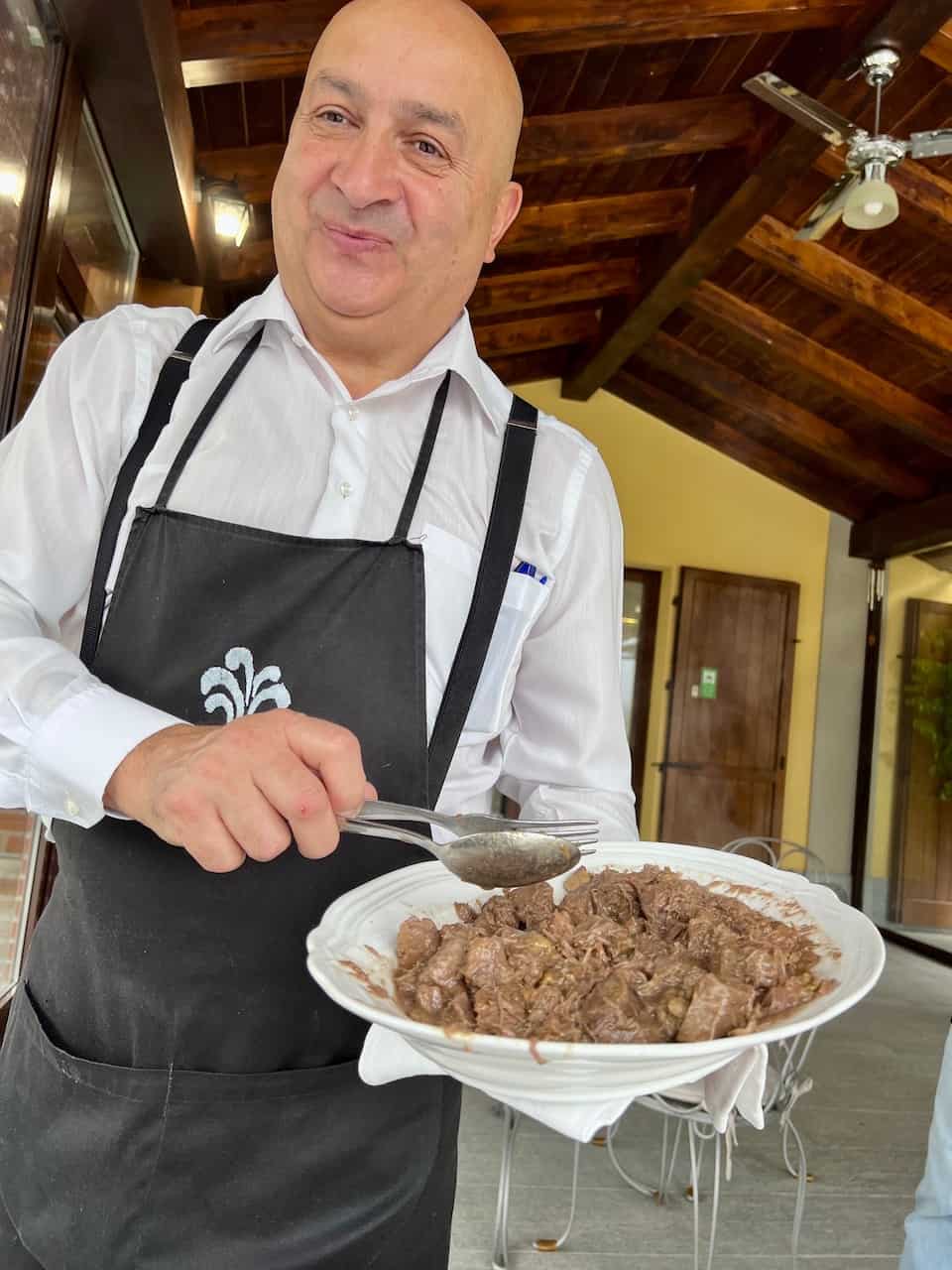
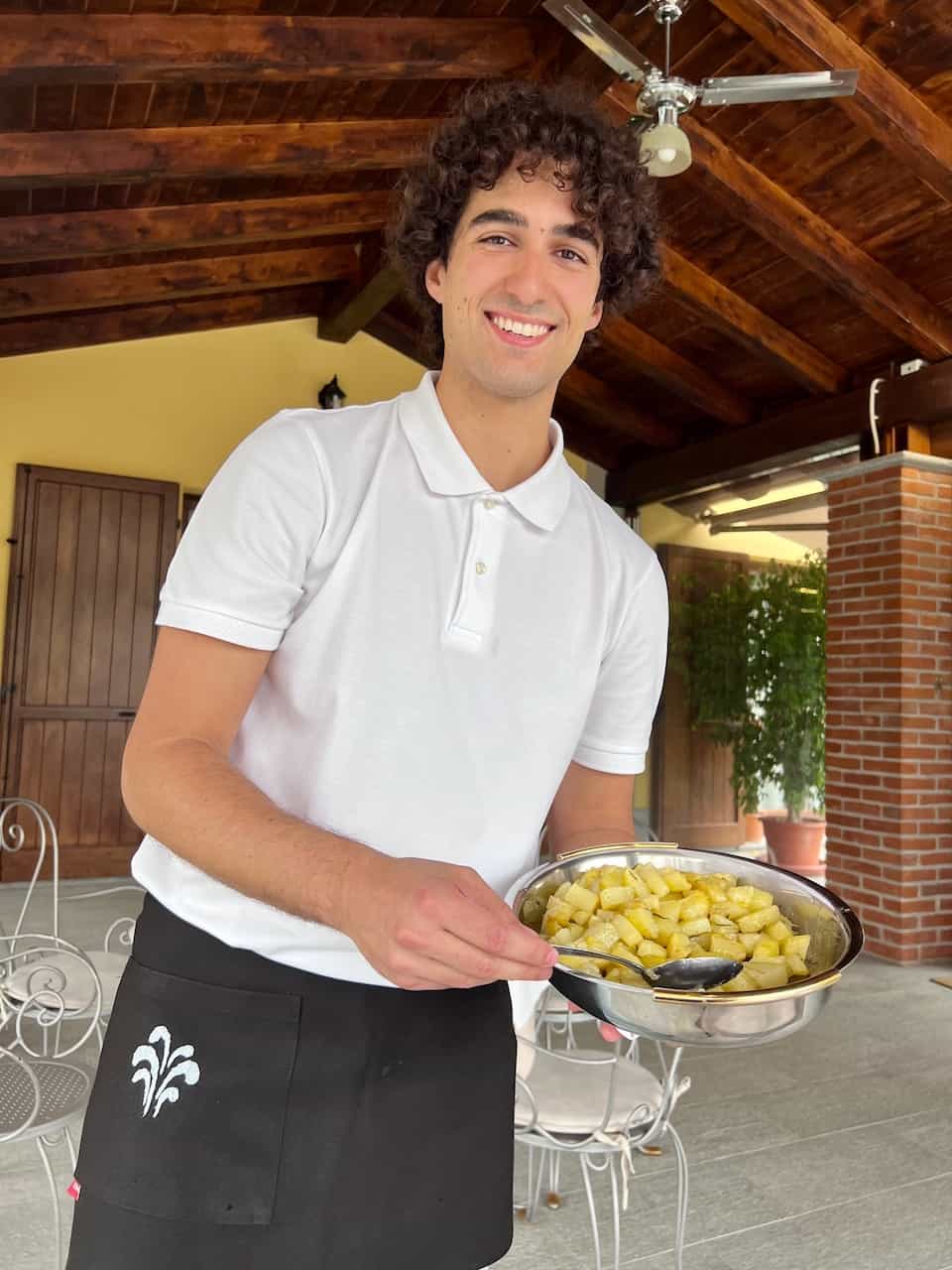
Rosignano Monferrato
Across the valley from Cella Monte lies the village of Rosignano Monferrato. The Capoluogo or ‘Chief Village’ sits atop a huge rock and is a maze of ancient streets and historic monuments.
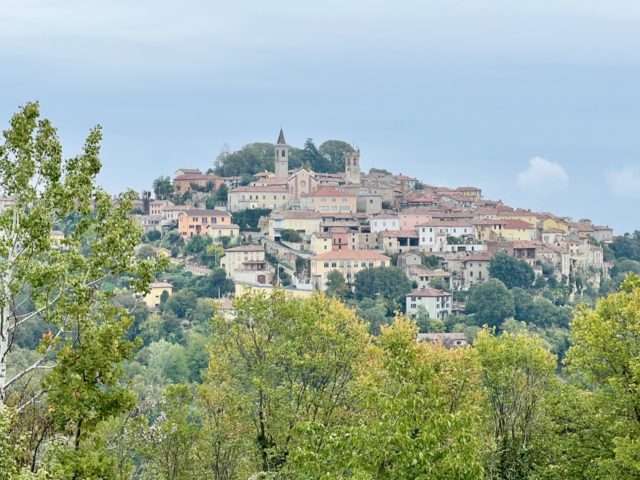
I followed the walking route I obtained from the tourist office and discovered a gorgeous village steeped in history. I took my time strolling around and discovered various points of historical interest such as the 12th century Romanesque Church of Sant’Antonio, the Town Hall with its infernot (open to the public), the 15th century San Vittore Church and the Mellana Castle.
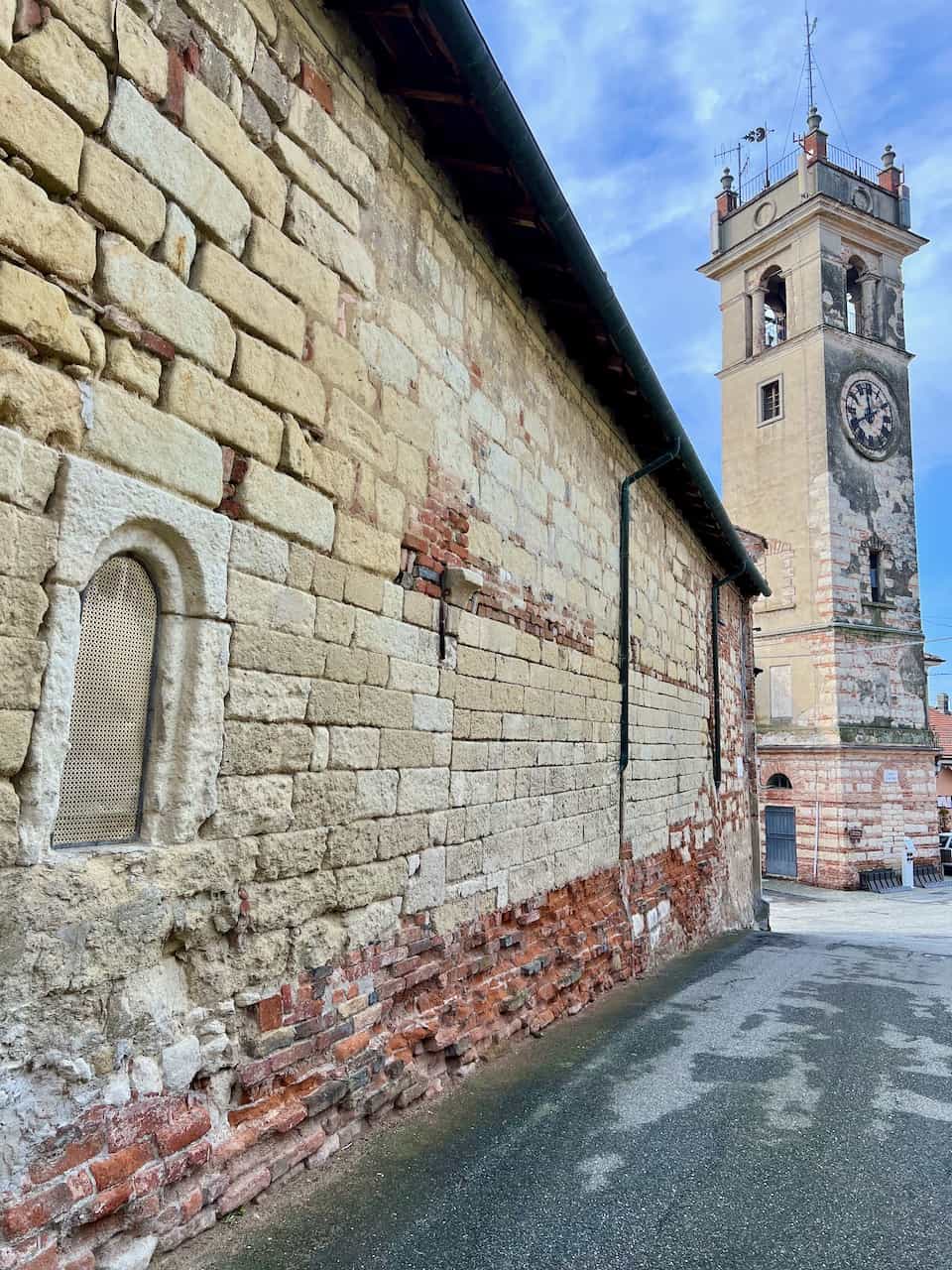
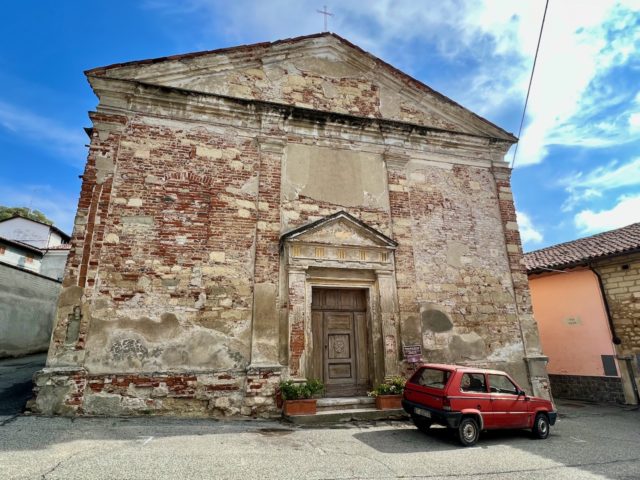
Rosignano Monferrato also has several viewpoints scattered around the village, where you can enjoy wonderful panoramic views.
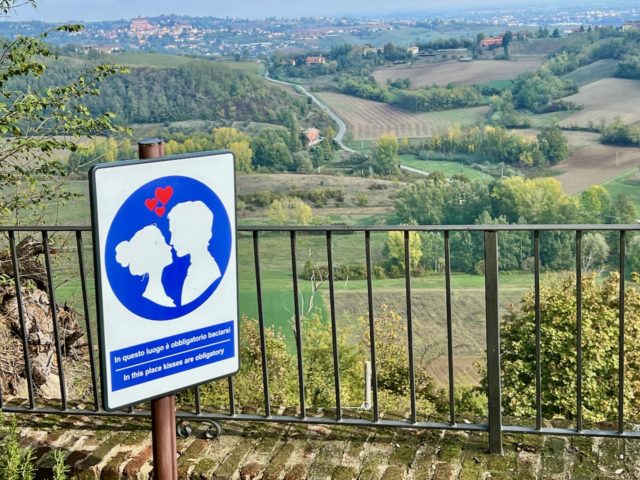
As I walked down the hill along Viale della Repubblica, I noticed the rock that the Capoluogo sits on. The exposed rock surface is quite impressive, and I found a little cave chapel, Madonna sotto il Sasso, as well as remnants of ancient quarries. There’s a trail that continues further down to the valley floor and up to the next village, Cella Monte. This circular trail is 11 kilometers long and passes vineyards, farmlands and various historic sights.
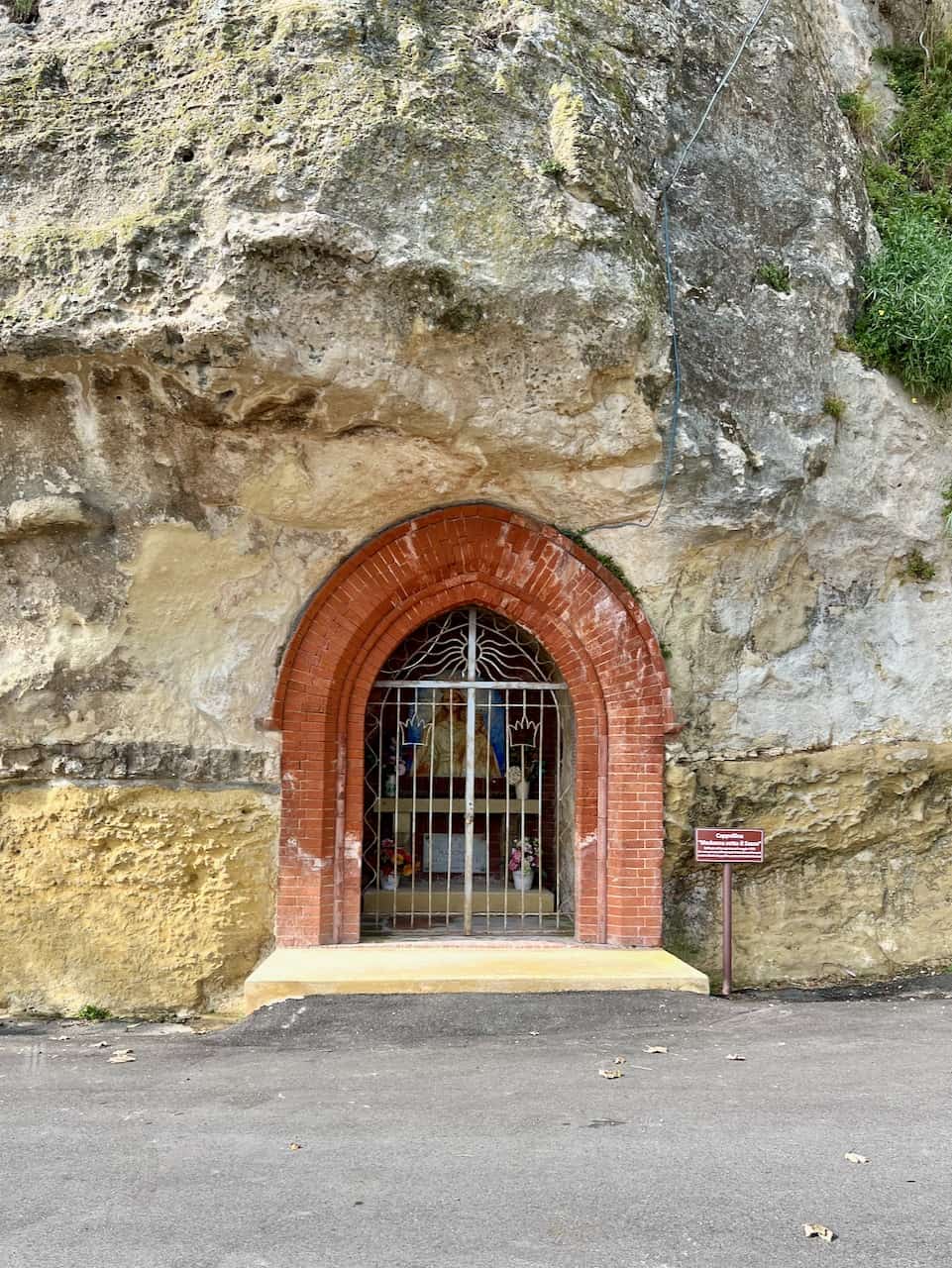
Ozzano Monferrato
Ozzano Monferrato is a wonderfully rustic medieval village topped by a beautiful church and an imposing castle. Places of historic and artistic interest in Ozzano Monferrato that are well worth a visit include the parish church of St. Salvatore and the adjacent bell-tower, and the church of Santa Maria Assunta.
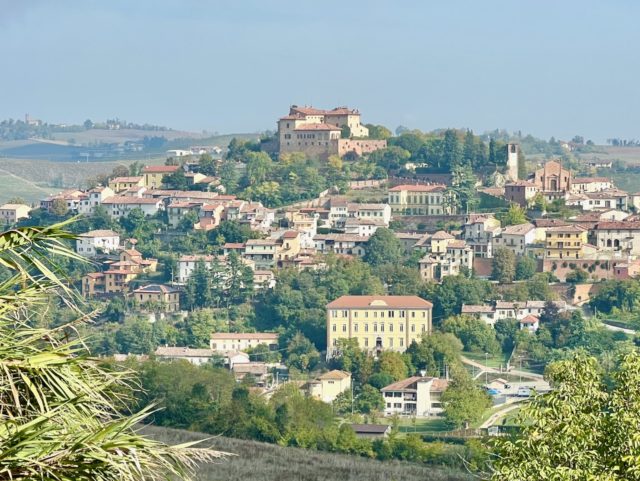
The Castle, a private property owned by the Visconti family, has its origins in the 12th century but the structures that can be seen today were built in the 16th and 17th centuries. The park surrounding the castle is home to centuries-old Lebanese cedars.
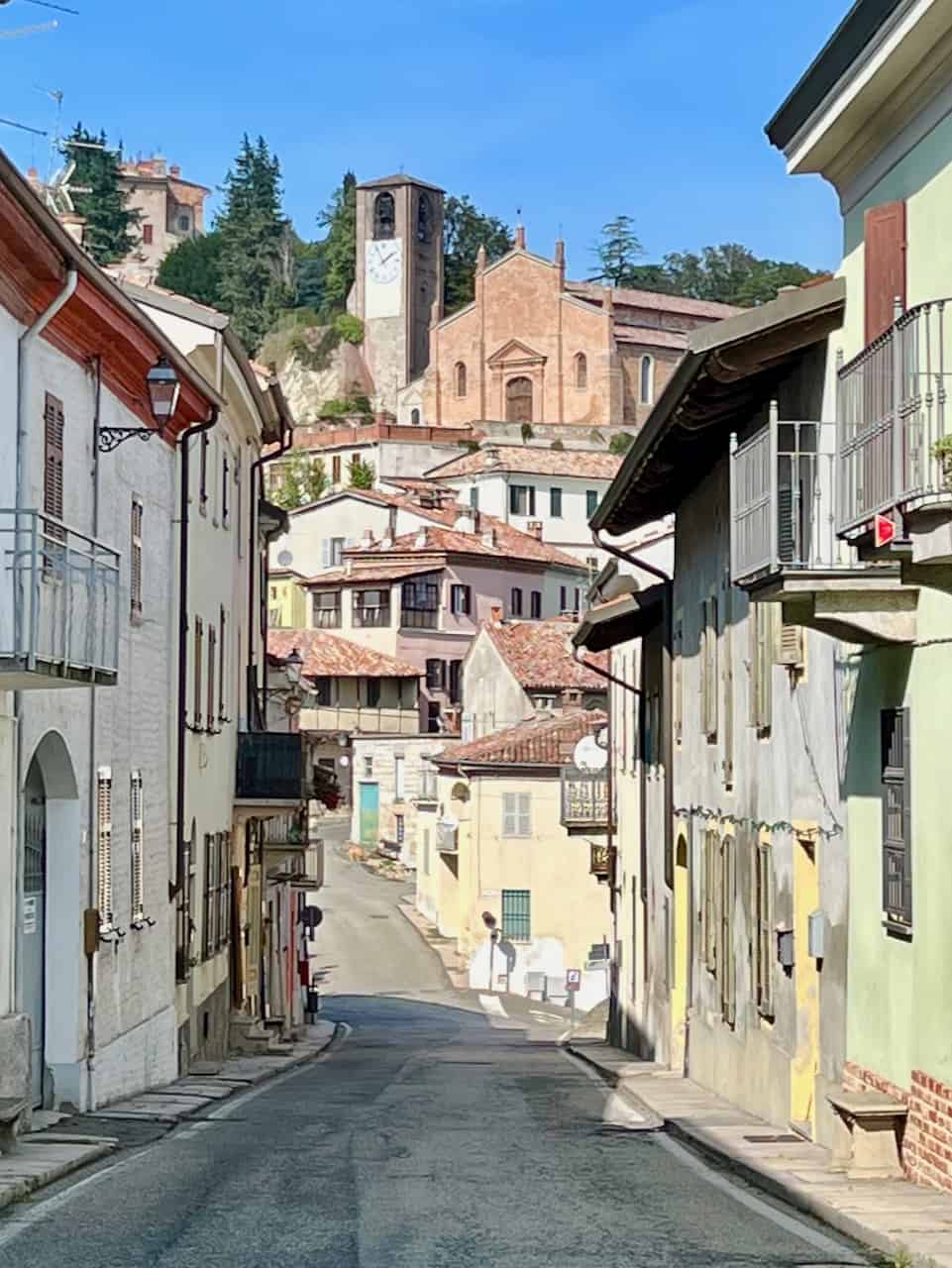
Ozzano Monferrato was my base for a few days as I explored the area. I stayed in the lovely La Corte Delle 4 Stagioni, a B&B located in a historic manor surrounded by sprawling gardens.
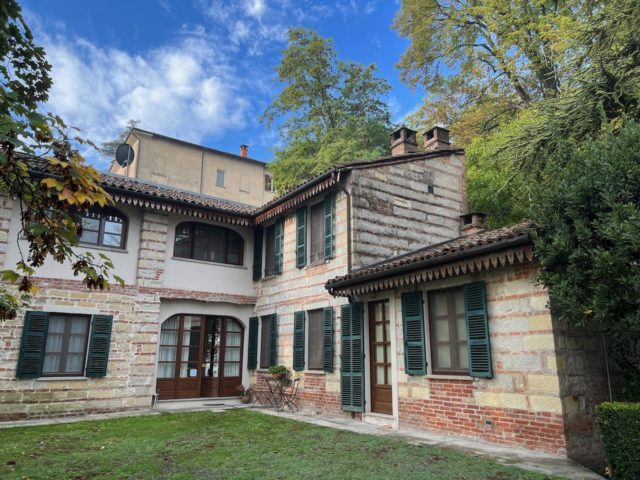
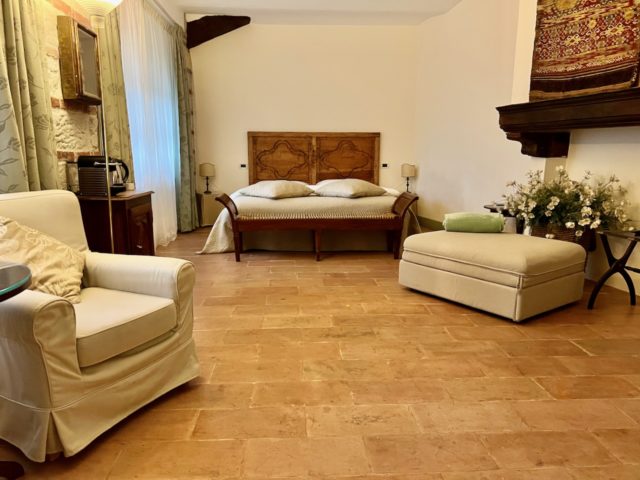
The ‘balconies’ of Monferrato
It was in Ozzano Monferrato where I first heard about the ‘balconies’ of the Monferrato villages. Situated on hilltops, many of the villages have ‘balconies’ or panoramic viewpoints. Just a minute’s walk from the B&B, I found my first ‘balcony’ right in front of the parish church of St. Salvador. The view of the verdant slopes and wave-like horizon was stunning! I went there several times, especially in the mornings when the mist-shrouded hills looked absolutely enchanting.
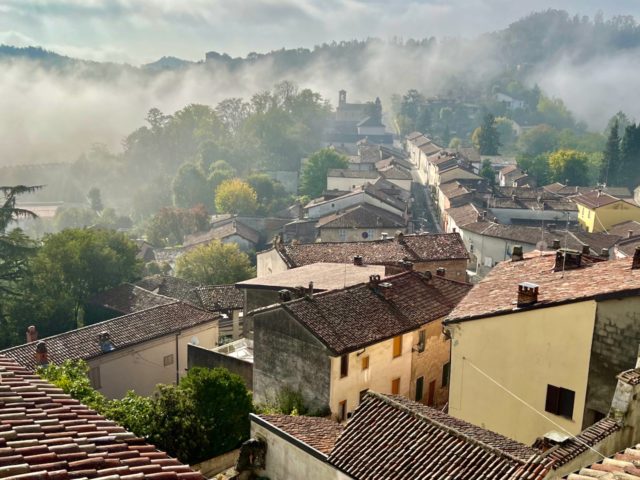
Cantine Valpane
There are numerous wineries around Ozzano Monferrato such as the Angelini Paolo winery but my favourite experience was at Cantine Valpane (info).
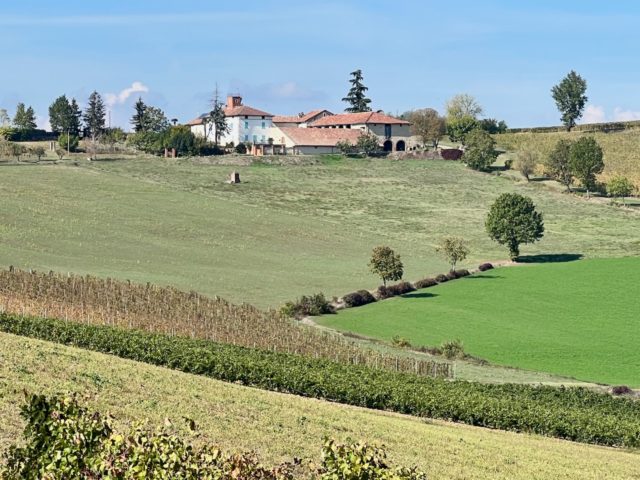
I’d emailed the proprietor and wine maker, Pietro, a few weeks before to book a visit to Cantine Valpane. He confirmed the date and time and added, “My English is not so good but the wines will speak for themselves”. I arrived to find that he’d invited his brother-in-law, Roberto, to help with translating, and his sister to serve some food. I felt so honoured and touched that he’d arranged all this!
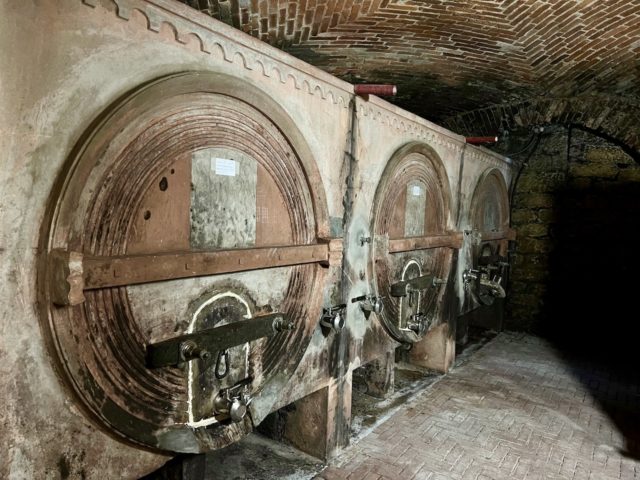
After touring the winery, they sat me down for a wine tasting with delicious food prepared by Pietro’s sister. Pietro regaled me with stories of the previous owner of the estate (dating back to the 19th century), how his grandfather took over and breathed new life into the winery, and how he, even as a young man, competed with his grandfather to create the best wines.
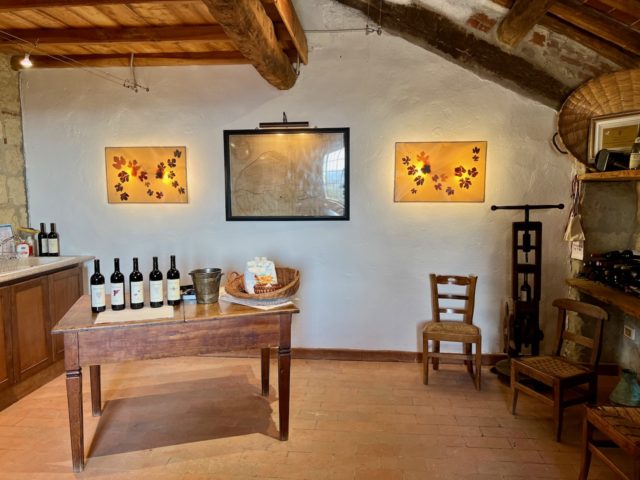
He served five different wines: a Grignolino del Monferrato Casalese (a local grape variety typical of Monferrato), three types of Barbera, and a Freisa (another local variety). I was especially enraptured by the Grignolino. Its colour, a translucent crimson, like liquid rubies, was simply mesmerising.
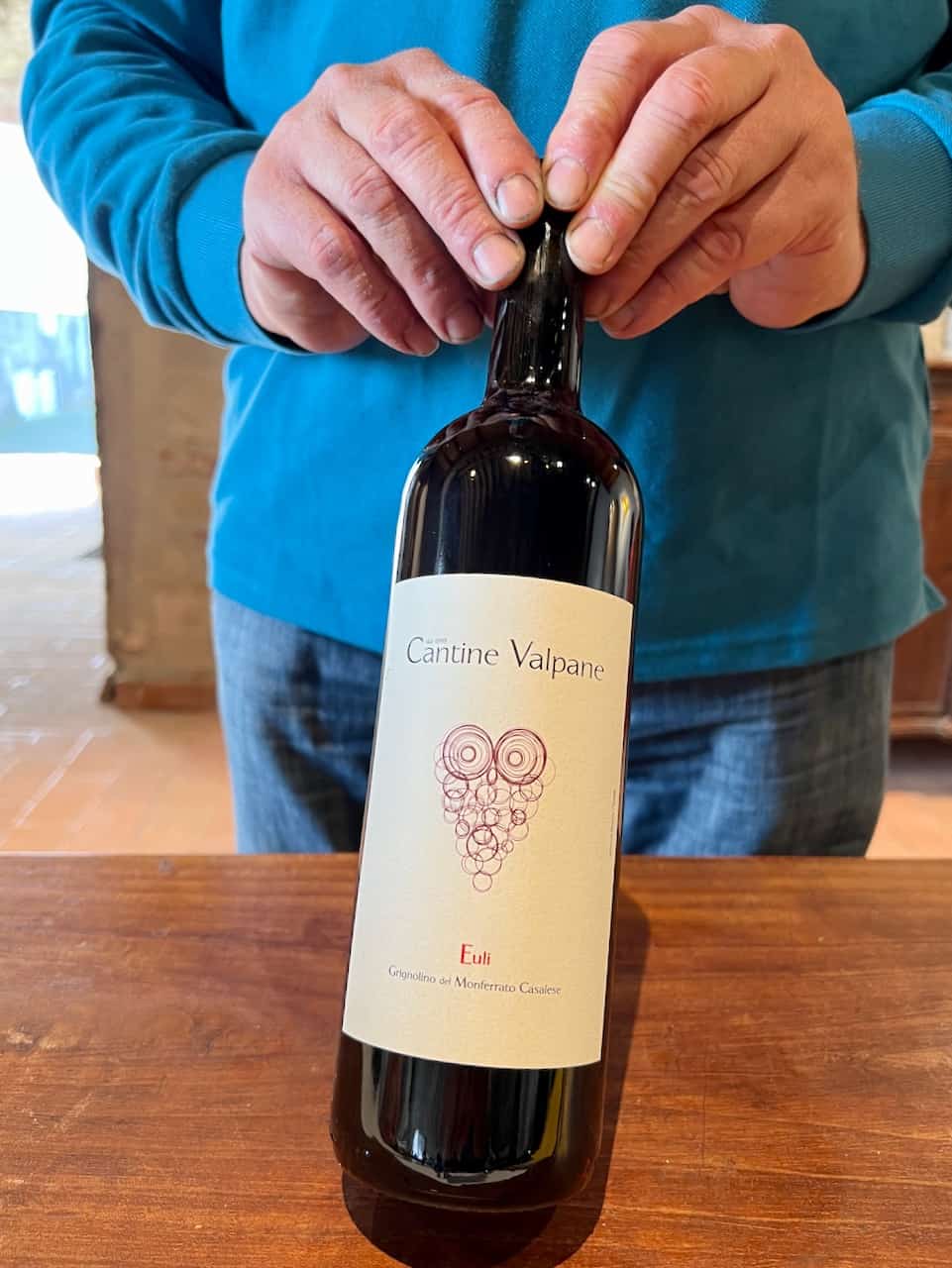
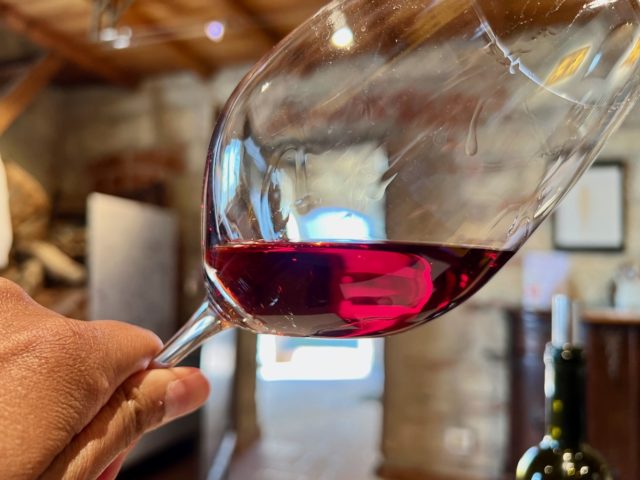
The Barbera del Monferrato was just as extraordinary; deep and earthy on the nose, a fresh acidity and exuberant notes of red berries.
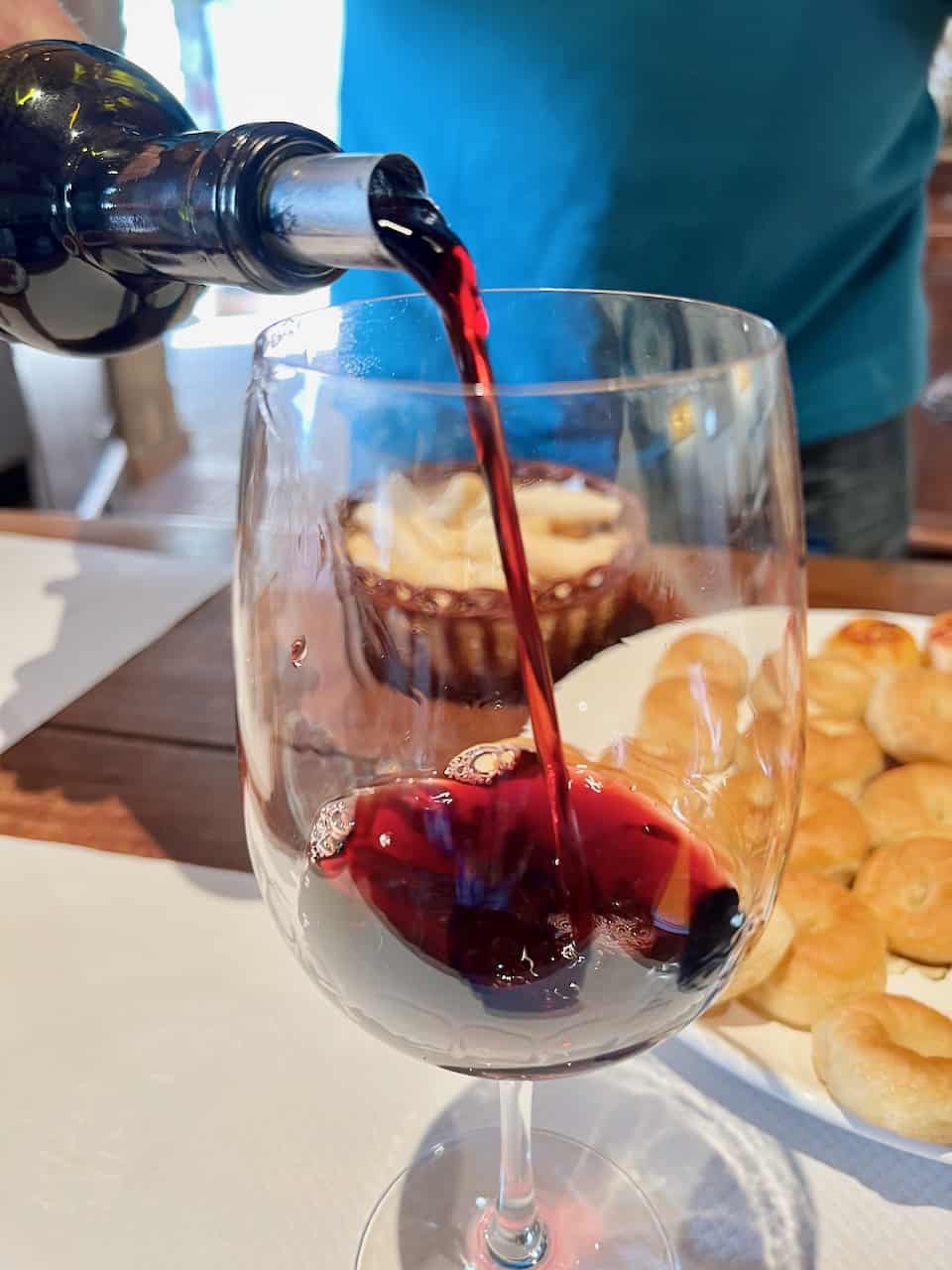
Pietro was right. His wines spoke. Of the complexity of the terroir, the mist that lingers in the valleys, the sun that bakes the earth and the timeless passion of its maker. He didn’t need a translator at all.
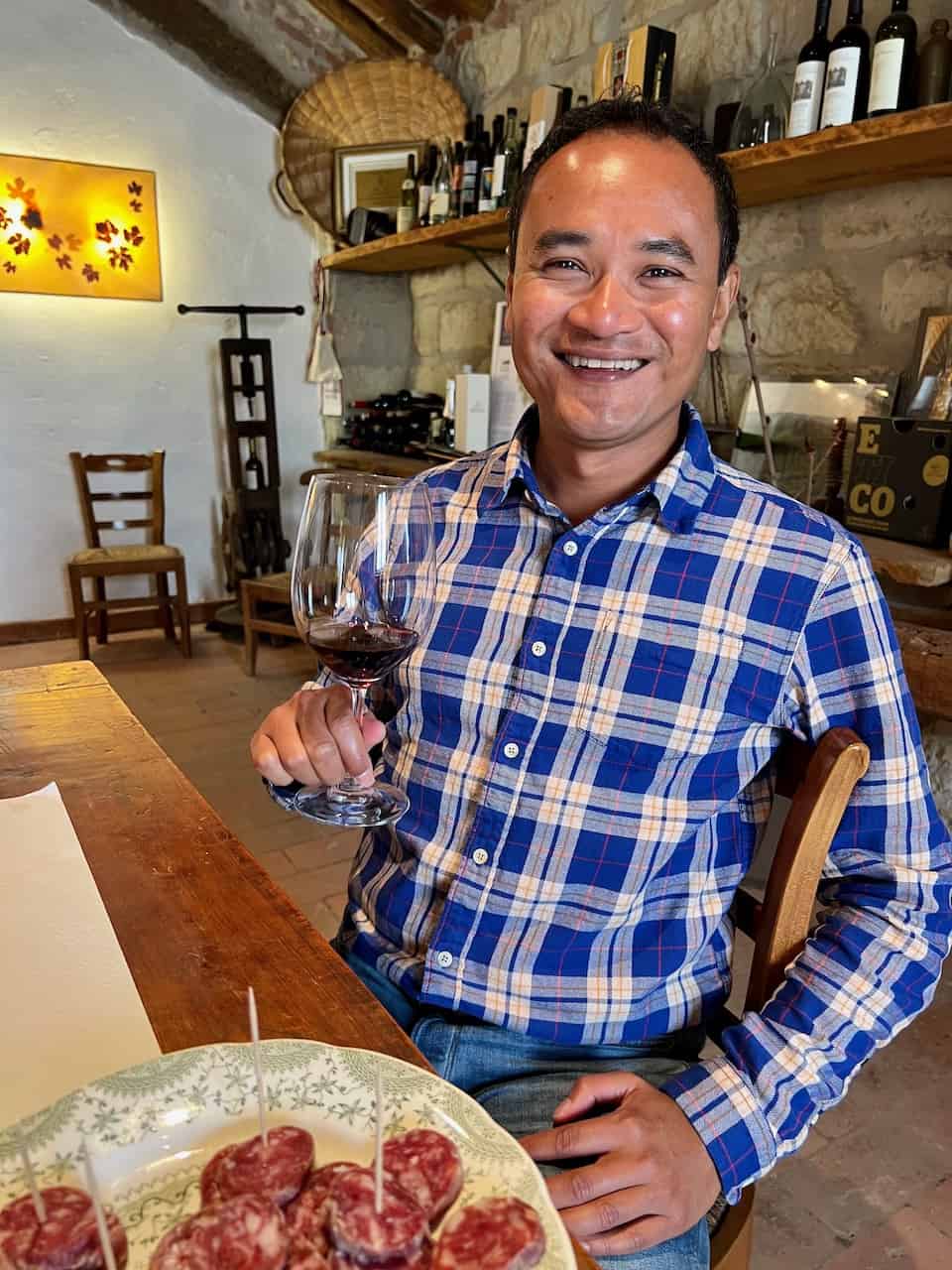
Sacro Monte di Crea
About a 15-minute drive from Ozzano Monferrato lies the majestic Sacro Monte di Crea (Sacred Mountain of Crea), one of nine UNESCO World Heritage listed sacred mounts in Piedmont and Lombardy (info). On the way there, I made a quick stop at the village of Cereseto, with its towering castle.
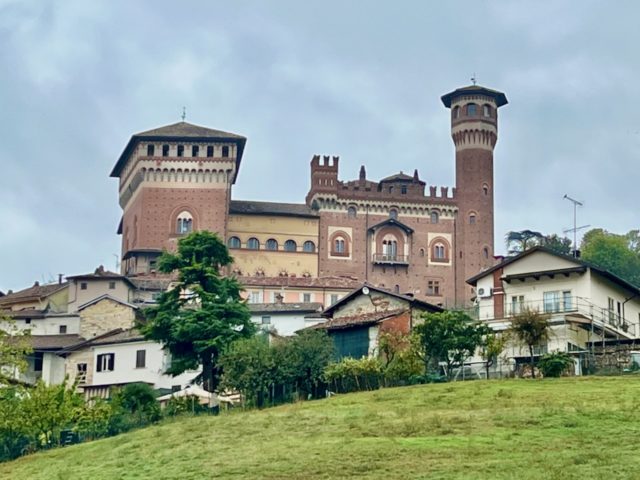
It was a foggy morning but my stroll around the monuments of Sacro Monte di Crea atop the forest-clad mountain was simply enchanting.
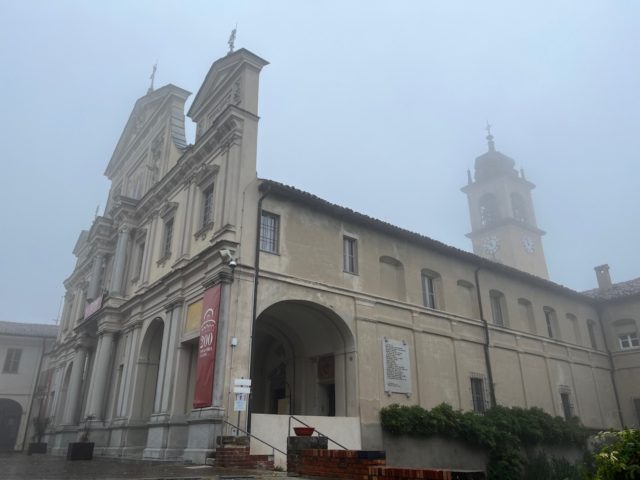
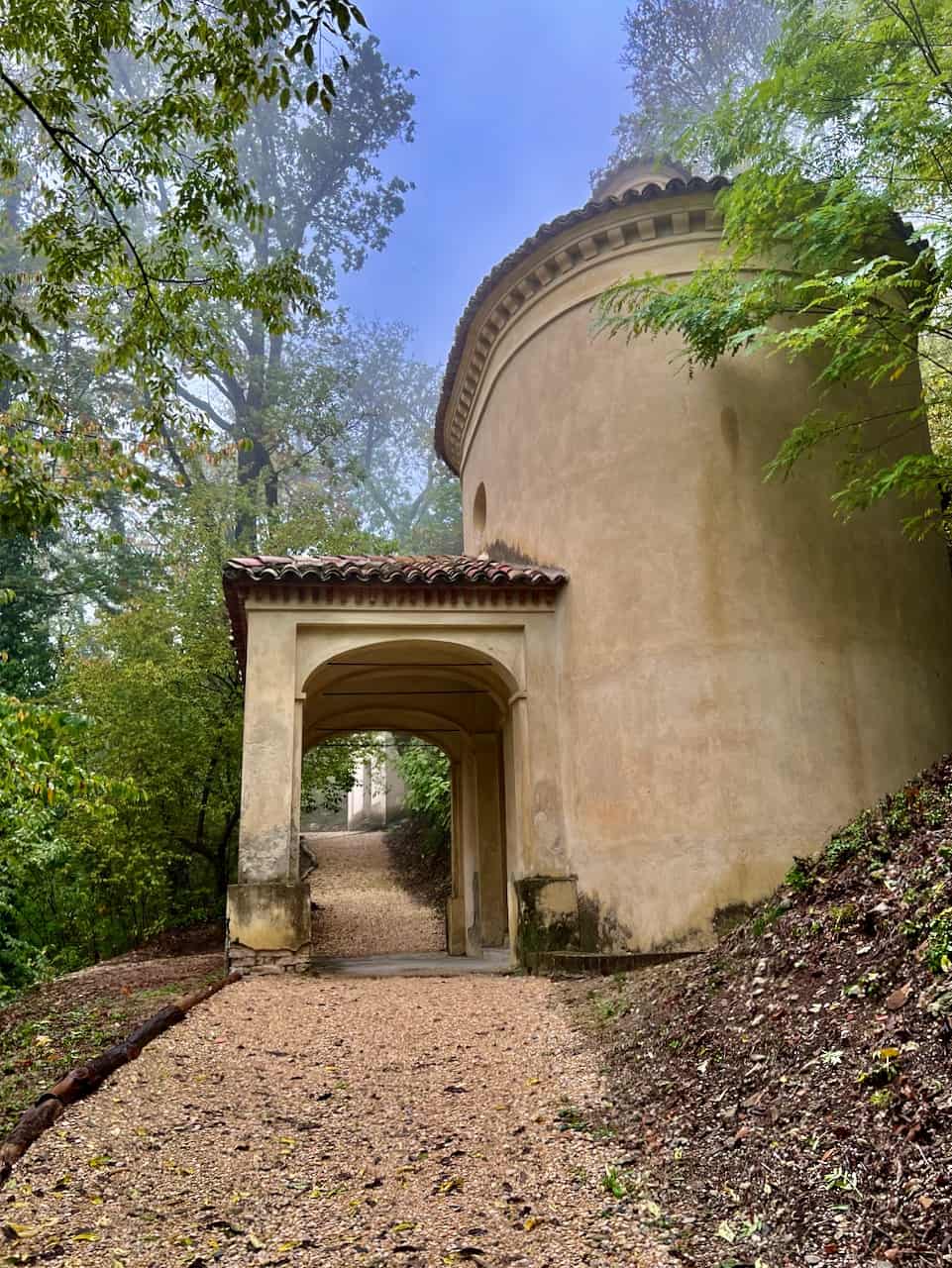
This sanctuary, with its amazing frescoes and statues, is one of the top places to visit in Monferrato, especially for religious art enthusiasts. I hiked to the highest and most impressive chapel, the ‘Paradise Chapel’, and was rewarded with panoramic views and magnificent depictions of Biblical scenes.
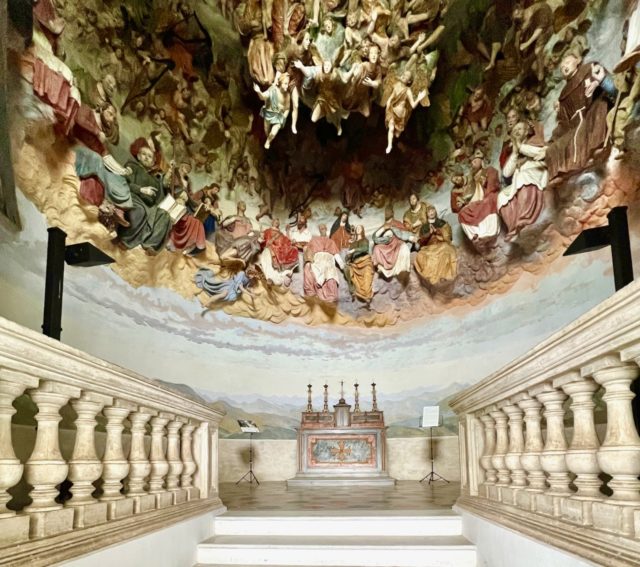
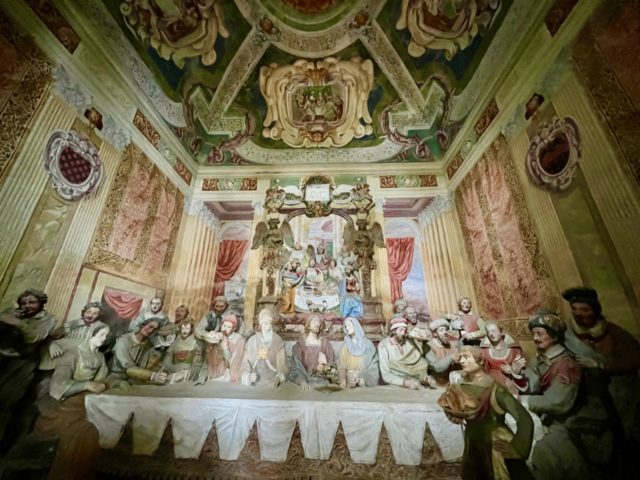
The chapels are fenced (often with mesh wire) and unlit so I stuck my phone’s lens through holes in the mesh to view the frescoes from outside.
Treville
One day, as I was making my way back to Ozzano Monferrato at around sunset, I stopped to take in the view of the hills cast in a warm, orangey glow. In the distance, I noticed a village topped by a pompous-looking structure, like a beacon overlooking the area. A quick check on Google Maps revealed that this was the village of Treville.
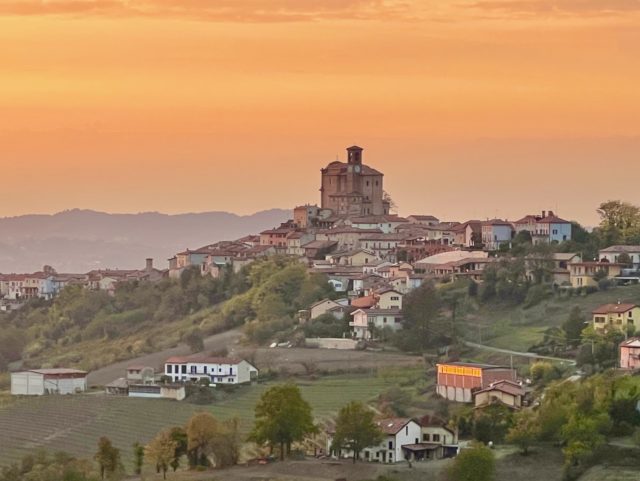
The next day, just a 5-minute drive from Ozzano Monferrato, I discovered a lovely village with the imposing Sant’Ambrogio church, the ‘beacon’ I saw the day before. Fronting the church was another Monferrato ‘balcony’ with stunning views. On clear days, the entire range of the Italian Alps can be seen from this balcony!

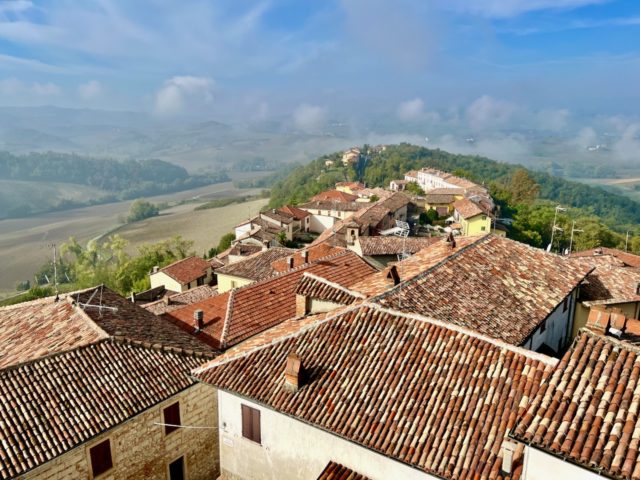
In Treville, I visited the village’s infernot, which is open to the public. I also learned about a 1-hour walking route that starts at the church and continues down to the valley floor, passing fields, vineyards and historic monuments such as the 12th century San Quirico church.
Casale Monferrato
Casale Monferrato lies on the banks of the Po River and has a fascinating history dating back to Roman times. Exploring this beautiful town one afternoon was another highlight of my trip around Monferrato.
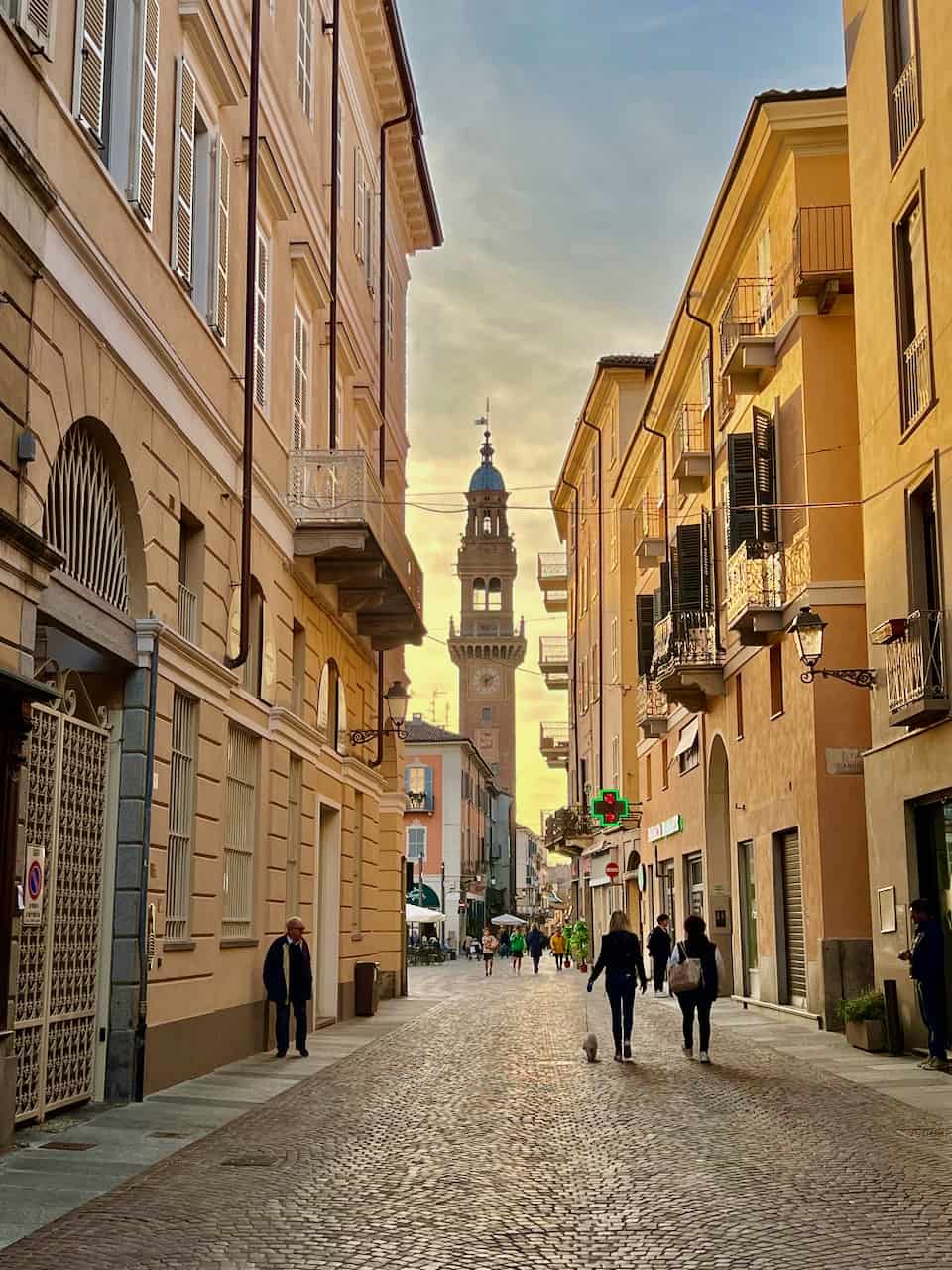
There are many places of interest in Casale Monferrato. The most important include the Civic Tower, 12th century Romanesque Cathedral, 16th century Synagogue and the Baroque Santa Caterina church.
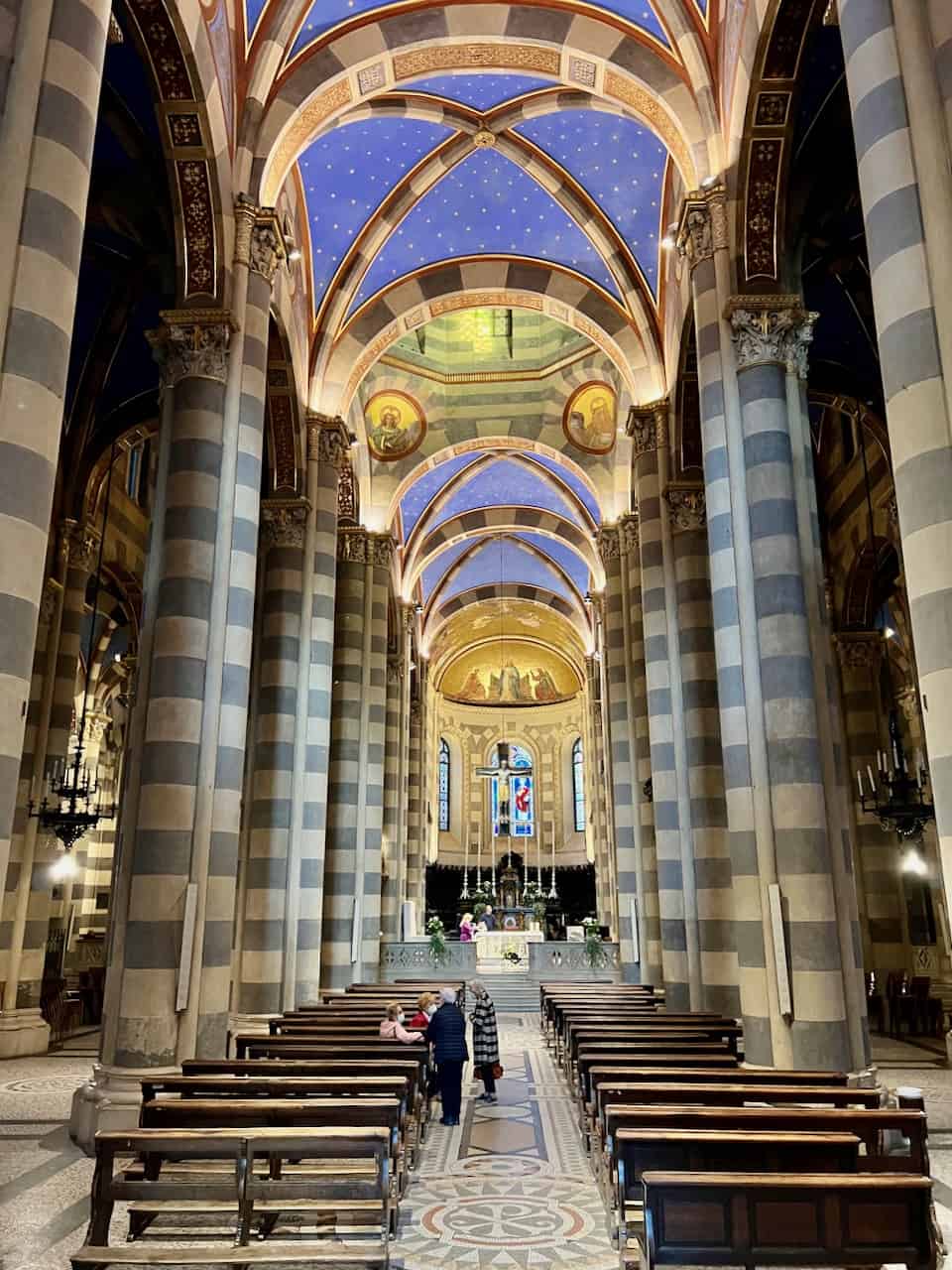
In addition, I loved strolling around its beautiful streets such as the Via Aurelio Saffi and Via Roma.
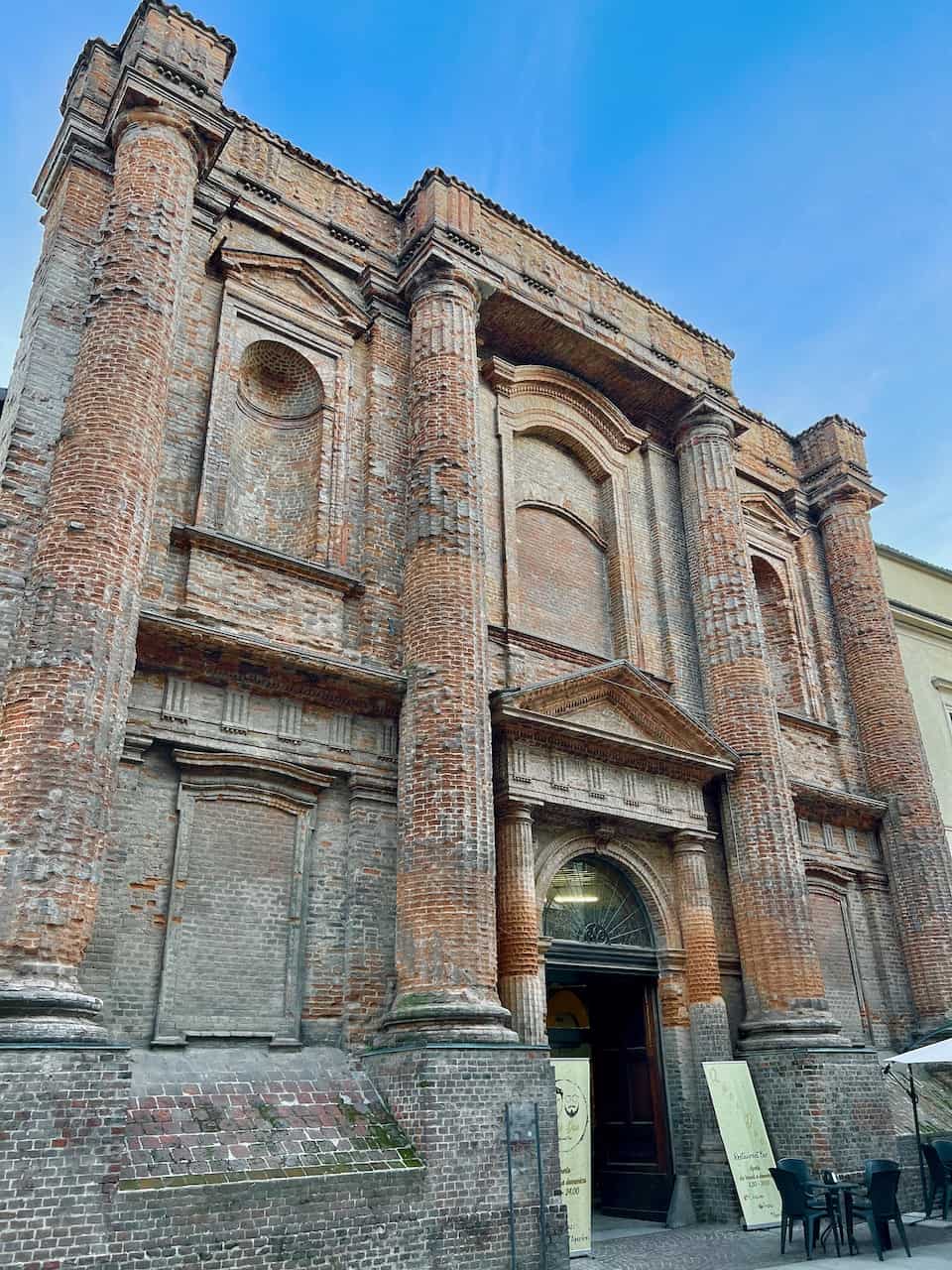
One street that was particularly impressive was Via Goffredo Mameli, with its palaces such as the Palazzo Gozani di Treville and the Palazzo Gozani di San Giorgio, now the Town Hall.
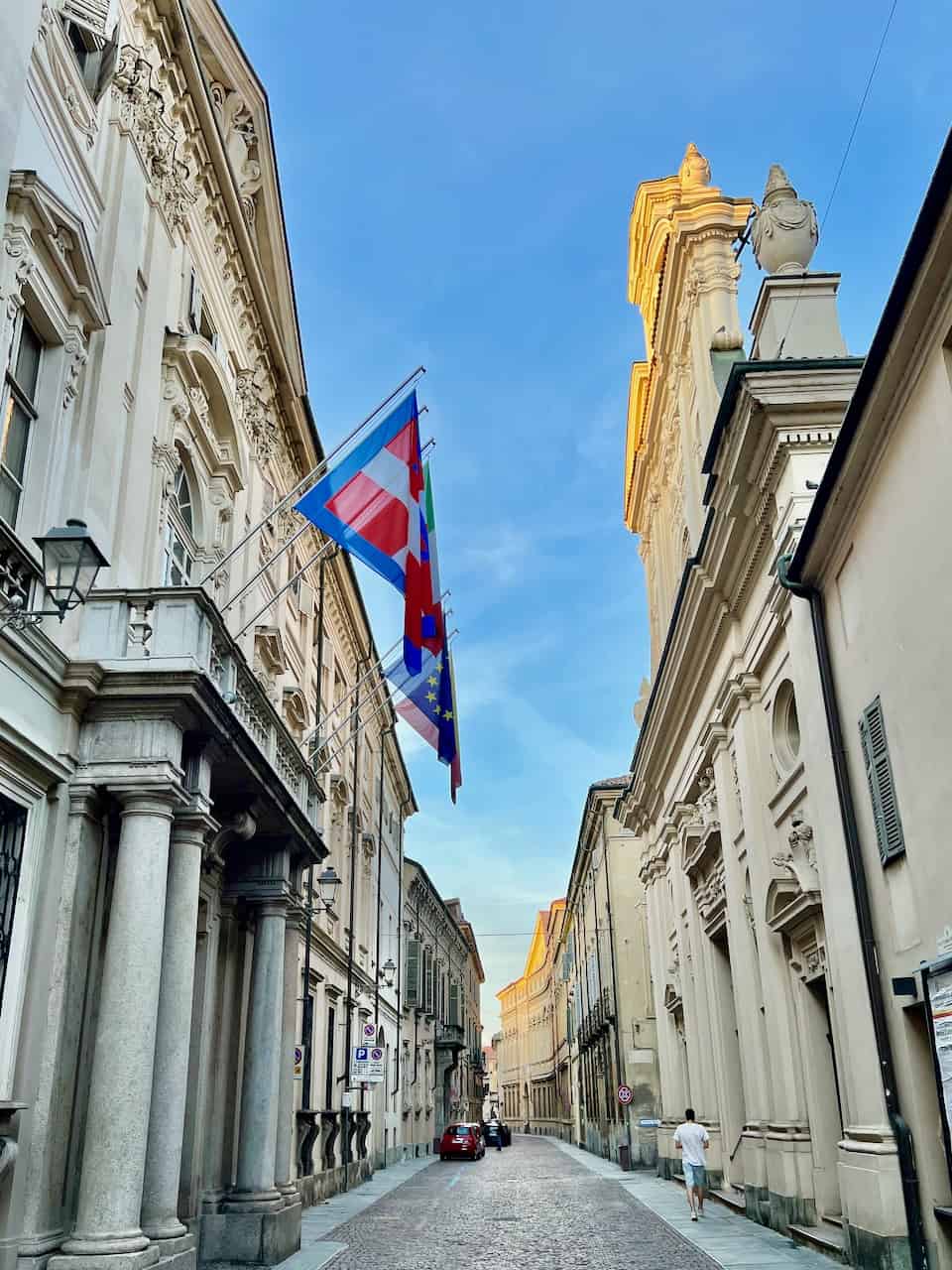
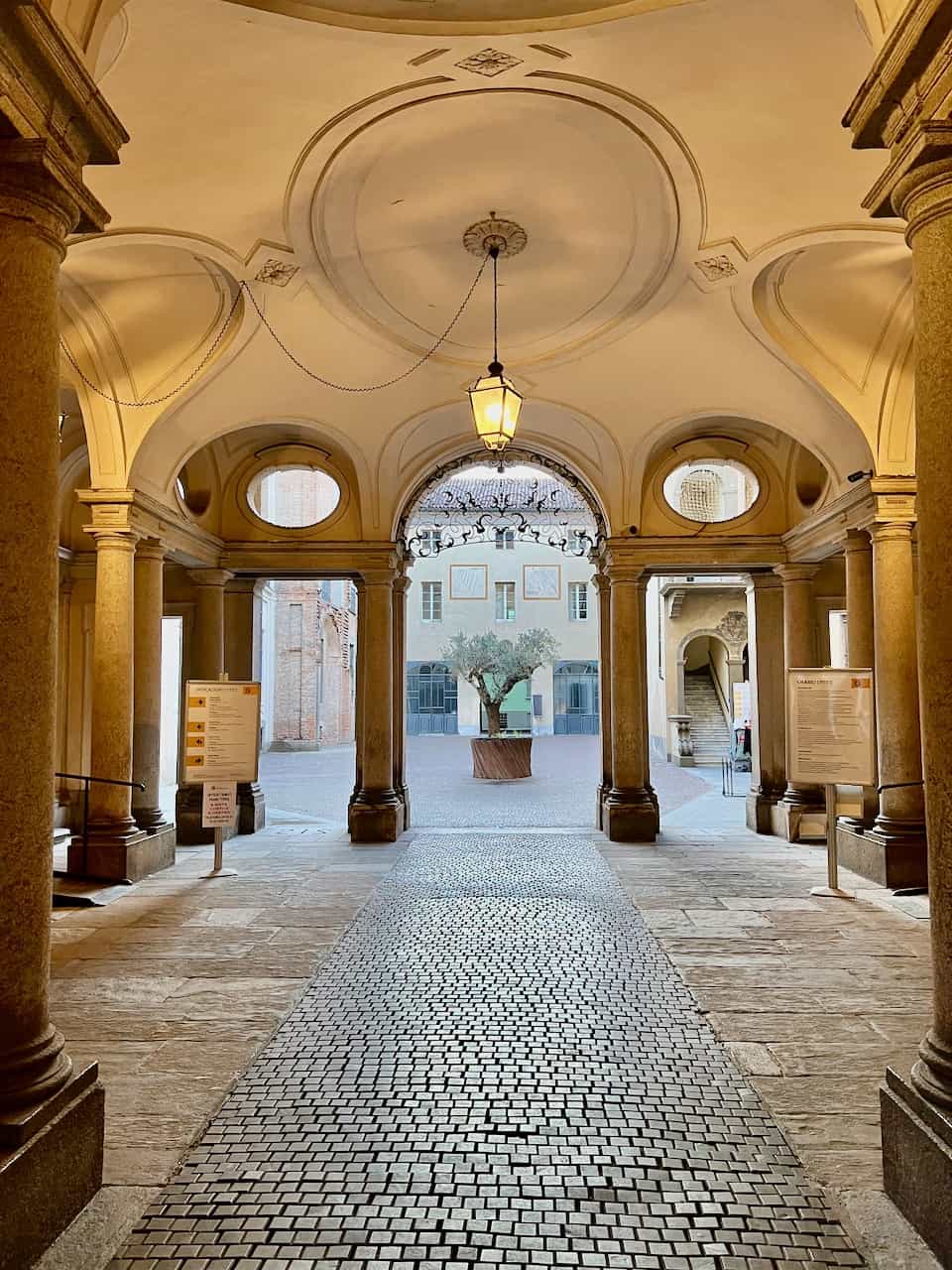
There are many other beautiful places in Monferrato to visit but alas, I only had a few days. I could easily spend a week or longer traversing the area. My plan is to return soon and explore other parts of Basso Monferrato and Alto Monferrato.
How to get to Monferrato
The area lies about an hour’s drive east of Turin and 1.5 hours west of Milan. Turin and Milan are about a 1.5-hour flight from Amsterdam (check flights). To explore the places and towns mentioned above, I recommend hiring a car.
Note: This Monferrato guide was written in collaboration with iambassador for the ‘Viaggio Italiano’ Project (Italian National Tourist Board, Ministry of Tourism & Conference of Regions and Autonomous Provinces).

